Gay Rights: The Cold War, the Lavender Scare, and Robert Cutler’s Story
(Photo Credits: The Lavender Scare)
There’s an interesting book released this week titled, Ike’s Mystery Man: The Secret Lives of Robert Cutler by Peter Shinkle. It’s about the Cold War, the lavender scare, and Robert Cutler. Shinkle by the way, has worked for almost two decades as a reporter and he happened to be Robert Cutler’s great-nephew.
But who exactly is Robert “Bobby” Cutler?
The book is set during the early days of the Cold War, a time when a geopolitical tension between the Soviet Union and the United States existed. The political climate caused security threats to rise; but the people’s fear and the paranoia that followed? It soared to unimaginable heights giving rise to Red Scare (communists had infiltrated the US government, they say) and worse, “gay men and lesbians were even more dangerous than Reds.” The result was McCarthyism, a period in the US when there was a practice of “making accusations of subversion or treason without proper regard for evidence.”
Reportedly, during his 1952 campaign, Eisenhower promised to “root out ‘subversives’ in the government” and he made good on his promise by issuing Executive Order 10450. Executive Order 10450 was a directive or guidance that detailed the “Security Requirements for Government Employment” meant to search for employees who were considered as “loyalty and security risk.”
Amidst the chaos brought about by the Cold War was the birth of an idea that being gay equaled to “espionage and betrayal.” “Homosexuality” at that time, was considered a mental illness and gays were seen as “untrustworthy” mainly because “they were vulnerable to (Soviet) blackmail” and therefore they “couldn’t be trusted with government secrets.”
This is where Cutler comes in because he served as Ike Eisenhower’s National Security Advisor, the one who “oversaw the drafting of Executive Order 10450” which was issued on April 27, 1953. Although it was recommended before, it was always disapproved but it was Cutler’s alleged endorsement that the memo be “toughened with more expansive language” that made the memo to be what it was. It specifically identified “sexual perversion” as among those considered a threat to the national security, Yahoo reports.
“Perverts” were therefore, banned from obtaining federal employment and the day the order was issued eventually went down in history as the day “Eisenhower declared war on ‘homosexuals’.” Anyone suspected of “sexual perversion” was subjected to “security sweeps by the FBI” and removed from federal employment. As a result, thousands of men and women lost their federal jobs (others chose to resign) and in some cases, their lives as well because those unable to endure the humiliation or unable to find new jobs took their own life.
Shinkle, the author of Ike’s Mystery Man: The Secret Lives of Robert Cutler, came across his Uncle Bobby’s six-volume personal diary, letters, as well as the Eisenhower Library which revealed Cutler’s sexuality and his unrequited love for a man named Tilghman B. “Skip” Koons. According to his obituary, Koons served in the “Executive Office of the President, as an adviser to General Robert Cutler from 1953 to 1957.” The witch hunt on gay people (known today as the lavender scare) however, would prove difficult as well for Koons and his lover Steve Benedict to stay in their White House jobs.
Cutler’s diary and letters reportedly contained passages full of longing for Koons such as this one from an entry in 1959 that said, “I love him with all my heart, more than I ever cared for any human being. But between us – me, 64-1/2, he 32-3/4 – the thought of love to his normal serene soul is out of course.”
Documentaries such as The Lavender Scare and Uniquely Nasty showed us what it was like to be gay in that era and hopefully this book, Ike’s Mystery Man: The Secret Lives of Robert Cutler, would as well. Maybe it can give us a look at the Eisenhower administration, Cutler’s life, and what led him to decide to help write Executive Order 10450 in that way (apart from the obvious reason that it was his job).
All of this, of course, happened during another time and President Bill Clinton had since then ended the ban on security clearance for gay employees in 1995 through Executive Order 12968. That’s forty-two long years after Executive Order 10450 was issued, which means during this long period of time, people continued to lose their jobs due to their sexuality (or suspected sexuality). And while Shinkle’s book on Robert Cutler’s life will not change the past, it will surely be an enlightening read.
It is important to read it and be informed because this piece of history paved the way for the birth of the LGBT movement and also because, as George Santayana had put it, “Those who cannot remember the past are condemned to repeat it.”




Related Articles